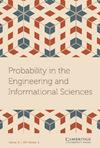Game-theoretic policy computing and simulation for blockchained buffering system via diffusion approximation
IF 1
3区 工程技术
Q4 ENGINEERING, INDUSTRIAL
Probability in the Engineering and Informational Sciences
Pub Date : 2024-01-12
DOI:10.1017/s026996482300027x
引用次数: 0
Abstract
We study 2-stage game-theoretic problem oriented 3-stage service policy computing, convolutional neural network (CNN) based algorithm design, and simulation for a blockchained buffering system with federated learning. More precisely, based on the game-theoretic problem consisting of both通过扩散近似实现区块链缓冲系统的博弈论策略计算与仿真
我们研究了面向两阶段博弈论问题的三阶段服务策略计算、基于卷积神经网络(CNN)的算法设计以及具有联合学习功能的区块链缓冲系统的仿真。更确切地说,基于由 "双输 "和 "双赢 "两阶段竞争组成的博弈论问题,我们通过零和博弈问题的鞍点和非零和博弈问题的纳什均衡点,推导出了三阶段动态服务策略。该政策涉及用户选择、动态定价以及通过稳定的数字货币为系统分配在线费率资源。主要重点是设计和分析给定队列/环境状态相关定价和效用函数的三阶段联合服务政策。这种动态服务策略的渐进最优性和公平性通过扩散建模和近似理论得到了证明。根据所谓的大模型框架,提出了基于 CNN 的通用策略计算算法流程图。对有三个用户的系统进行了仿真案例研究,通过零和双成本博弈竞争策略,在一个时间点上只能选择三个用户中的两个进入服务。然后,被选中的两个用户通过非零和双成本博弈竞争策略进入服务并共享系统速率服务资源。此外,还简要说明了我们的策略在未来基于区块链的互联网(如元宇宙和 web3.0)和供应链金融中的应用。
本文章由计算机程序翻译,如有差异,请以英文原文为准。
求助全文
约1分钟内获得全文
求助全文
来源期刊
CiteScore
2.20
自引率
18.20%
发文量
45
审稿时长
>12 weeks
期刊介绍:
The primary focus of the journal is on stochastic modelling in the physical and engineering sciences, with particular emphasis on queueing theory, reliability theory, inventory theory, simulation, mathematical finance and probabilistic networks and graphs. Papers on analytic properties and related disciplines are also considered, as well as more general papers on applied and computational probability, if appropriate. Readers include academics working in statistics, operations research, computer science, engineering, management science and physical sciences as well as industrial practitioners engaged in telecommunications, computer science, financial engineering, operations research and management science.

 求助内容:
求助内容: 应助结果提醒方式:
应助结果提醒方式:


